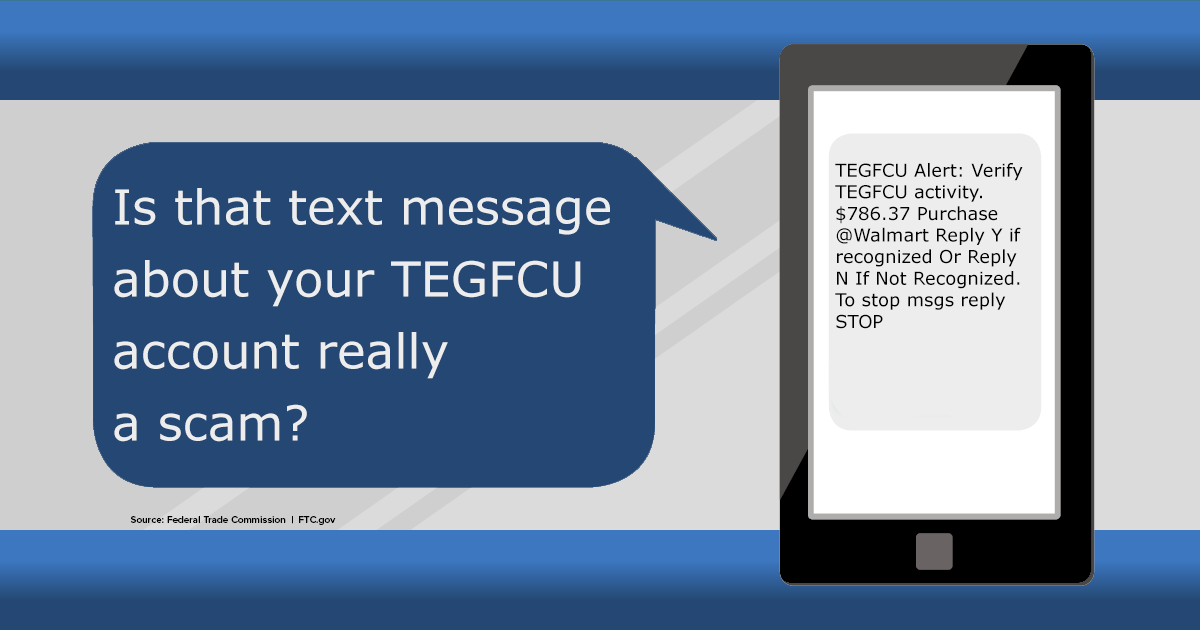The Federal Trade Commission (FTC) is warning consumers about text message scams.
The FTC found that fake bank fraud alerts were the most common text message scam reported in their study. The study also revealed that many popular financial text scams pretend to be from reputable banks and credit unions like TEGFCU.
In 2022, the FTC listed the top five text message scams. They provided examples of how scammers create deceptive messages to trick people. In 2022, text message scams caused consumers to lose $330 million, which is over twice the amount reported in 2021. The number of reports regarding texts pretending to be from banks and credit unions has risen almost twenty times since 2019.
The study analyzed 1,000 text messages reported to the FTC. They discovered that many of these messages were fake credit union security alerts. These texts create a sense of urgency, urging people to verify unauthorized withdrawals or large purchases. A fake credit union representative connects with those who respond.
The best way to protect yourself is to be aware of these scams. If you get such a message, stop and wait to respond. Check your recent bank account transactions on digital banking. If you have any concerns, contact our Solution Center at 845-452-7323 right away.
Reputable credit unions such as TEG Federal Credit Union also offer mobile alerts to our members through digital banking. Alerts can be sent via mobile SMS, email, or push notification to a mobile device. In Digital Banking, Navigate to Tools and Alerts to set up your alert preferences.
Always contact your bank or credit card company using the phone numbers provided on your statements or credit/debit card. Always contact TEG Federal Credit Union at 845-452-7323.
What are the most common Credit Union texting scams?
- We have locked your account
- Someone made a large purchase, transfer, or withdrawal
- Someone attempted to log into your account
- You need to update your account info
- Someone is attempting to send you money via Zelle or Venmo
- Password reset requests
Here are some easy guidelines to remember when you receive a suspicious text message:
Take your time. Be cautious before clicking links, logging in, or making calls, as the message could be a scam.
Just because it appears to be from a familiar company doesn’t guarantee it’s real. Scammers are relying on you to act quickly without thinking. By the time you realize something might be wrong, it’s too late.
Never click links or call numbers. Do not click links or call numbers in a text, even if you believe it is real. To check if a text is real, call a known legitimate phone number for the business mentioned.
When they call you, scammers use spoof numbers that look like those from real businesses. Clicking a link may result in receiving a call from a scammer. The caller ID might display the name of a reputable bank.
If you receive an unexpected call from someone saying they are from TEGFCU, hang up and call back at 845-452-7323. Do not give out personal or financial information such as card numbers or your social security number.
You have the option to activate settings that will prevent unwanted texts. You can block spam calls and specific callers. Android and iPhone users can also apply filters to their text messages.
Will TEG Federal Credit Union ever send me a text message? Yes, we send SMS text alerts, but they will always come from our unique shortcode, 67669.
Remember, keep your accounts safe and avoid fake bank texts by:
- Always use secure and unique passwords and change them regularly.
- Enable 2FA (Two-Factor Authentication) on your accounts for added protection. With 2FA enabled, a password alone will not gain access to your account.
- Never share passwords with anyone.
- Never click on links in text messages. Clicking on a link in a text message easily installs viruses and malware.
- Add shortcodes to your contact list so you can easily identify legitimate texts. TEGFCU’s unique shortcode is 67669. If the SMS text comes from a 10-digit phone number, do not reply to it. Call our Solution Center at 845-452-7323 to verify the text.












